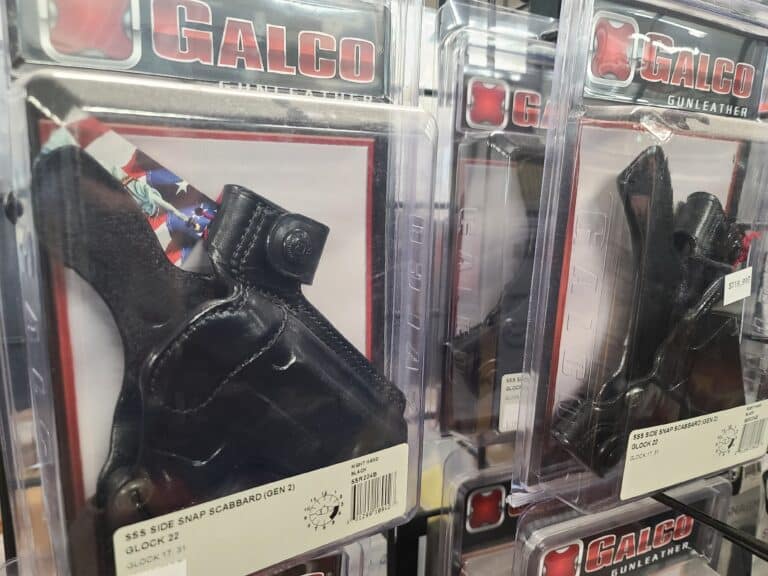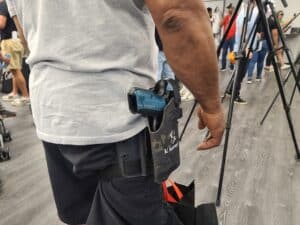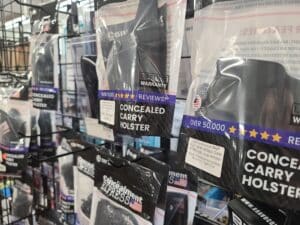Prospective gun carriers in the Golden State are breathing a sigh of relief Thursday morning.
California lawmakers failed Wednesday night to get SB 918, a wide-ranging bill restricting concealed carry rights, across the finish line. The bill fell two votes short of the two-thirds majority support it needed to clear the legislature.
The final vote marks a rare defeat for new gun regulations in a state known for having the strictest gun laws in the nation. The bill’s chances of success were made more difficult due to the decision of state Senator Rob Portantino (D.), the lead sponsor of SB 918, to add an urgency clause to the bill. The clause would have made the bill take effect immediately upon passage rather than in the following year, but it increased the votes required for passage from a simple majority to a two-thirds requirement. It also faced opposition from the California State Sheriffs’ Association.
A separate gun control measure, AB 1227, also failed to make it out of the legislature Wednesday night. That bill would have tacked on an additional ten percent tax on all gun purchases in the state in order to fund “gun violence prevention” programs and research.
The failure of the legislation in one of the country’s most liberal states could signal a new political limit for strict gun-control laws. If California is unable to pass onerous gun-carry restrictions or a large gun tax, other states may have difficulty finding the votes to do so. The defeat of the bills combined with the recent Supreme Court gun-carry ruling also mean many more Californians will be able to legally buy and carry guns.
Gun-rights advocates in the state cheered the demise of the gun legislation.
“California now joins the other 42 states that already issues these licenses freely to law abiding citizens and have experienced a decrease in violent crime as a result of the deterrent effect on criminals,” Chuck Michel, President of the CRPA, said in a statement. “CRPA is notifying local jurisdictions of their constitutional obligations to process applications quickly. We anticipate some stonewalling and game playing from certain localities hostile to gun ownership. We will see those hold outs in court very soon.”
The bill had the high-profile backing of Governor Gavin Newsom (D.) and Attorney General Rob Bonta (D.), the latter of whom personally spent several hours on the floor of the legislature Wednesday night trying to whip votes for the bill.
It was also championed by the nation’s most prominent gun-control organizations, who expressed outrage at its failure.
“A dangerous Supreme Court decision recently put California families and communities at risk, yet last night too many of our representatives disregarded that danger and neglected to take action,” Shannon Watts, founder of Moms Demand Action, said in a statement. “Lawmakers must act in the wake of this reckless court decision, like in New York, where a similar bill has already gone into effect after state lawmakers acted with urgency.”
But the Sheriffs’ association public opposition proved politically substantial as well. Currently, California sheriffs are the ones in charge of issuing permits.
“The circumstance of a CCW holder committing a crime is exceedingly rare yet this bill imposes overreaching provisions that will likely be challenged in court, leaving uncertainty in issuance procedures,” Cory M. Salzillo, the group’s legislative director, said in a letter to lawmakers. “Instead of focusing on a law-abiding population, efforts should address preventing gun crimes committed by those who disobey the law and holding them accountable.”
In addition to instituting a collection of new restrictions on who can obtain a license and where they can legally carry, the sheriffs argued the new bill would create more work for them with little benefit to the public.
“The new workload resulting from vetting procedures and a codified judicial appellate process for persons denied a CCW license will burden issuing authorities, court officers, and the judiciary toward little to no increase in public safety,” Salzillo said.
Watts called on the Governor to “act because our lawmakers didn’t have the courage to” by calling a special legislative session in order to get the bill passed.
Officials with the Governor’s office were critical of the bill’s outcome, and expressed frustration that certain fellow Democrats sat out the vote, but would not commit to calling a special session to revive the bill.
“Last night’s vote was a grave disappointment,” Daniel Villaseñor, a spokesperson for Newsom, told The Reload. “Getting a similar bill back to the Governor’s desk should be the first order of business in the next legislative session, and the Governor looks forward to signing an urgency measure as soon as possible that will ensure California’s concealed carry laws are anchored in public safety and common sense.”
Portantino expressed shock and disappointment at SB 918’s failure to gain enough support in the heavily Democratic state legislature.
“California was made less safe tonight by not passing the bill to make us consistent with the Supreme Court’s decision,” he said. “It’s unfortunate, it’s sad, it’s surprising.”
He promised to reintroduce the bill when the legislature reconvenes this December. Gun-rights groups cautioned the fight was far from over.
“While we are thrilled to report these wins, we know that nothing is ever truly ‘dead’ in Sacramento, and legislators have already pledged to bring SB 918 back in the new year,” the California Rifle and Pistol Association (CRPA) said in a press release. “AB 1227 has already been introduced and defeated several times, so there’s no reason to think it won’t be back as well.”
Touted by supporters as a direct response to the Supreme Court’s June decision in New York State Pistol and Rifle Association v. Bruen, SB 918 sought to add dozens of new restrictions for Californians to lawfully carry a firearm for self-defense. The state was forced to remove its previous “good cause” requirements after the Supreme Court deemed such subjective standards unconstitutional. In its place, SB 918 would have raised the minimum age to carry from 18 to 21, required at least 16 hours of firearms training, and added a good character standard that would require at least three personal references and a social media check.
It also sought to add dozens of new “sensitive areas” where licensed gun owners would not be allowed to carry, including all school grounds, college and university campuses, government and judicial buildings, medical facilities, public transit, public parks, playgrounds, public demonstrations, and any place where alcohol is sold.
A similar law, passed by the state of New York shortly after the Bruen decision, was allowed to take effect on Thursday after a U.S. District Court judge denied a motion from gun rights groups to block its enforcement due to a lack of standing. However, the judge noted in his accompanying analysis that he would have enjoined the law’s “good moral character” requirement, social media checks, and “sensitive places” restrictions on the merits.
“While pursuing the laudable goal of public safety, and in an attempt to curb ever-increasing mass shootings, the New York State Legislature has generated an unconstitutional statute in the CCIA,” District Judge Glenn Suddaby wrote.
Given the law’s similarities, that analysis calls into question the long-term viability of legislation like SB 918 even if it were reintroduced in a future session, a point not lost on the California State Sheriffs’ Association.
“To address the holding of the United States Supreme Court in Bruen, which struck down ‘good cause’ requirements in CCW statutes, a bill could have been offered that simply eliminated that constitutionally infirm provision,” Salzillo said. “Instead, SB 918 creates an unnecessarily complicated, burdensome, and overreaching licensing scheme that invites judicial scrutiny and seems destined to be struck down, in part or in whole.”
Lawmakers did manage to pass one gun-related bill. AB 160 trys to clarify the intent of a law signed by Governor Newsom in July aimed at banning advertising firearms to minors. However, the original law’s broad language had a chilling effect on youth shooting sports in the state and drew legal challenges from gun-rights groups.
The revised language passed unanimously Wednesday night. It exempts any advertising for classes or events related to firearm safety, hunting, sport shooting, or promoting membership in any organization. However, the gun-rights advocates challenging the law have vowed to continue their suit against the law. They argue the changes do not fix the core First and Second Amendment problems the law creates.
A federal judge will hear a request by the advocates for a preliminary injunction blocking the law later this month.
UPDATE 9-1-2022 7:40 PM EASTERN: This piece has been updated to include comments from Governor Gavin Newsom’s Office.






